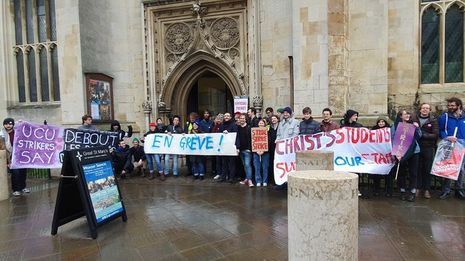CUCU launch College Anti-Casualisation Campaign
Cambridge University and College Union state the chief aim of the campaign is to “transform hourly-paid supervision jobs into real jobs”

Cambridge University and College Union (CUCU) last week (23/06) launched the 'College Anti-Casualisation Campaign'. The campaign aims to complement the anti-casualisation efforts that have been ongoing since December 2018.
The campaign aims to secure “paid training for postgraduate students who teach and supervise, and to transform hourly-paid supervision jobs into real jobs.” One of the proposals is the piloting of a “cross-appointed college lectureship scheme in the subjects that make more regular use of casualised supervisors.”
The scheme intends to “not only allow colleges to reduce extreme casualisation, but also to rely on more stable and foreseeable forms of teaching.”
In 2017-2018 casualised academic workers - such as staff members on zero-hour contracts or those engaging in hourly paid labour taught 45% of undergraduate supervisions.
The campaign suggests that these supervisors “experience significant and unpaid demands on time in the training, planning and preparation for supervisions, uncertainty arising from unpredictable, and meagre remuneration offered by the colleges.”
CUCU states it has directed its demands towards colleges in particular because they are the employers of undergraduate supervisors. They described that “the only way to address the job insecurity of this category of teachers is through an anti-casualisation campaign tackling the colleges specifically.”
The campaign argues that colleges also stand to benefit from the proposed change as the existing system is inefficient. On the current model colleges must source teachers every term. Instead, CUCU propose that, if a college relies heavily on casualised teaching in a particular subject, “colleges can split the cost of a more secure teaching position with another college.
"The worker gets a secure job, and the colleges have a dedicated new staff member to provide the bulk of their teaching in that subject.”
Anti-casualisation papers have been sent to the Senior Tutors Committee for discussion. When contacted for comment by Varsity, the Committee responded that they have already been “representing the concerns of casual supervisors about their teaching load in Easter term, given the adjustments by Faculties and Departments to planned assessments.”
Further, “after a preliminary discussion by the Senior Tutors’ Business Committee in mid-June, we have proposed to the Graduate Union and CUCU representatives that we have an early conversation with them to discuss the proposed scheme and look forward to that meeting taking place in the coming days or weeks.”
CUCU have been engaged in anti-casualisation campaigning since December 2018 when they sent an anti-casualisation claim to the University.
Since then, progress has been made on their demands. In November 2019 the University agreed to consider “the transfer of hourly paid teachers to employment contracts” and a “review of around 700 fixed-term contracts in roles of an ongoing nature, to identify those who could be transferred from fixed-term to open-ended roles.”
However the onset of Covid-19 has threatened the advances that have been made. The University has said it is continuing it’s Temporary Recruitment Freeze and is discontinuing the Contract Extension Scheme.
This, CUCU argue, “will put hundreds of University workers in a dire financial situation”. At the same time, “the workload for remaining staff will increase further, to levels which might become unsustainable.
"There is a danger that proposed pay-cuts and threatened redundancies will entrench the inequalities that currently exist between casualised and permanent staff.”
 News / Cambridge study finds students learn better with notes than AI13 December 2025
News / Cambridge study finds students learn better with notes than AI13 December 2025 News / Cambridge Vet School gets lifeline year to stay accredited28 November 2025
News / Cambridge Vet School gets lifeline year to stay accredited28 November 2025 Science / Did your ex trip on King’s Parade? The science behind the ‘ick’12 December 2025
Science / Did your ex trip on King’s Parade? The science behind the ‘ick’12 December 2025 News / Uni Scout and Guide Club affirms trans inclusion 12 December 2025
News / Uni Scout and Guide Club affirms trans inclusion 12 December 2025 Arts / Modern Modernist Centenary: T. S. Eliot13 December 2025
Arts / Modern Modernist Centenary: T. S. Eliot13 December 2025










